Key takeaways:
- BaaS democratizes access to financial services, enabling startups to innovate without the complexities of traditional banking infrastructure.
- Key benefits of BaaS include faster time-to-market, scalability, and managed compliance, allowing businesses to focus on growth.
- Future trends in BaaS emphasize customization, AI integration, and RegTech solutions to enhance user experience and regulatory compliance.
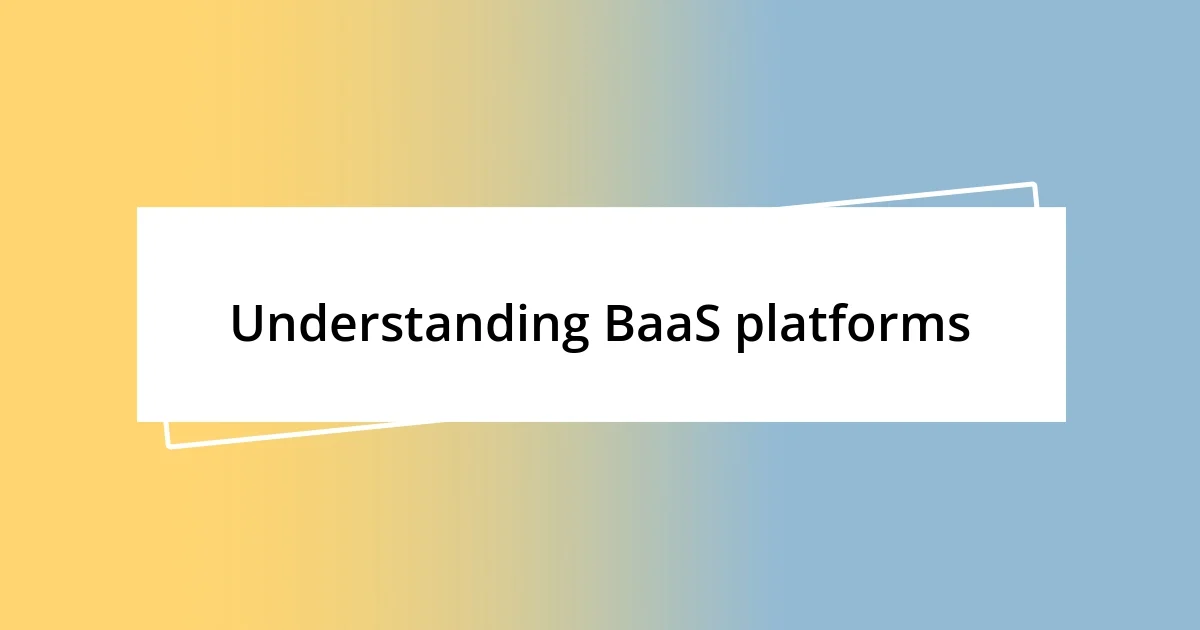
Understanding BaaS platforms
BaaS, or Banking-as-a-Service, is a model that allows businesses to offer banking services without having to develop the underlying infrastructure themselves. I remember when I first heard about this concept; it felt like a eureka moment, realizing how it could empower startups to innovate rapidly. Just think about it—how many brilliant ideas have been stalled because of the heavy lifting required to establish banking frameworks?
By leveraging BaaS, companies can integrate banking features like payments, loans, and account management into their own applications through APIs. This seamless integration is not only efficient but also incredibly appealing to customers who appreciate the convenience of having financial services at their fingertips. I’ve often wondered how many businesses would flourish if they could simply plug into these services instead of getting bogged down with compliance and security issues.
One of the most exciting aspects of BaaS is how it democratizes access to financial services. It’s like opening the floodgates for innovation in the fintech space. Personally, I’ve seen startups transform their ideas into viable products because they can focus on their core competencies while relying on BaaS platforms to handle the complexities of financial offerings—which is a game changer in an industry that typically sees a high barrier to entry.
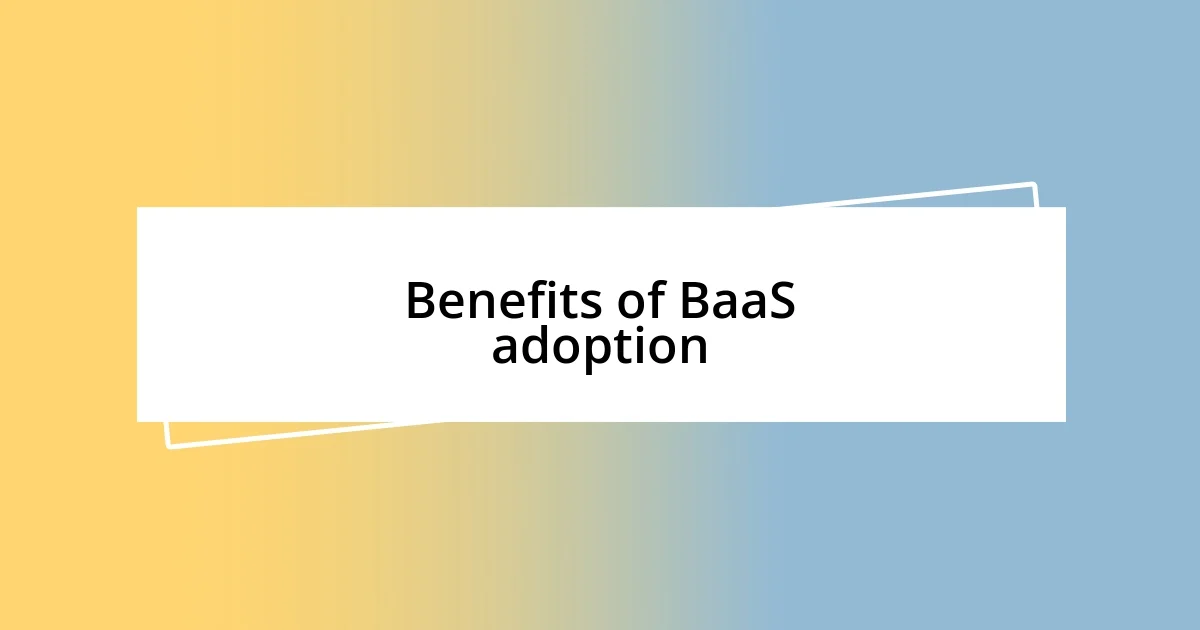
Benefits of BaaS adoption
Adopting BaaS can significantly reduce time-to-market for new financial products. I recall a friend who launched a fintech startup; instead of spending months developing their own banking infrastructure, they used a BaaS provider, which allowed them to roll out their services in just weeks. This rapid deployment not only saved them resources but also provided a competitive edge in a fast-paced market.
Moreover, BaaS platforms offer scalability, meaning businesses can effortlessly adjust their offerings based on demand. I’ve witnessed companies that could quickly scale up their services during peak seasons without worrying about the backend complexities. This flexibility is crucial in today’s business environment where consumer preferences can shift rapidly, leading to opportunities that require swift action.
Another benefit lies in compliance and security. Traditionally, managing compliance for financial services can be daunting. Yet, I’ve seen how BaaS providers take on this massive burden. By adhering to strict regulations, they allow businesses to focus on growth without constantly looking over their shoulder for potential pitfalls.
| Benefit | Description |
|---|---|
| Time-to-Market | Faster product launch through pre-built infrastructure |
| Scalability | Ability to easily adjust services based on market demand |
| Compliance | Providers manage regulatory requirements, easing the burden on businesses |

Key features of BaaS solutions
BaaS solutions come packed with key features that truly empower businesses in the financial services landscape. What stands out to me is the flexibility these platforms offer. I recall working with a client who desperately needed a customizable banking solution. They found a BaaS provider that allowed them to tailor features specific to their target audience, which really revolutionized their service delivery. It’s amazing how the ability to adjust functionalities can directly influence customer satisfaction and loyalty.
Some of the essential features of BaaS solutions include:
- API Integration: Simplifies the connection between business applications and banking services.
- Customizable Dashboards: Provides businesses with user-friendly data visualization tools.
- End-to-End Service Management: Covers everything from account creation to transaction processing.
- Robust Security Features: Ensures compliance with regulatory standards to safeguard sensitive data.
- Multi-currency Support: Enables businesses to operate in various markets with ease.
I’ve seen firsthand how these features not only enhance operational efficiency but also foster innovation. The client I mentioned earlier went from feeling overwhelmed by the complexities of banking logistics to confidently navigating their market with a bespoke solution. It’s such moments that solidify my belief in the power of BaaS—truly transformative for businesses keen on thriving in a competitive environment.
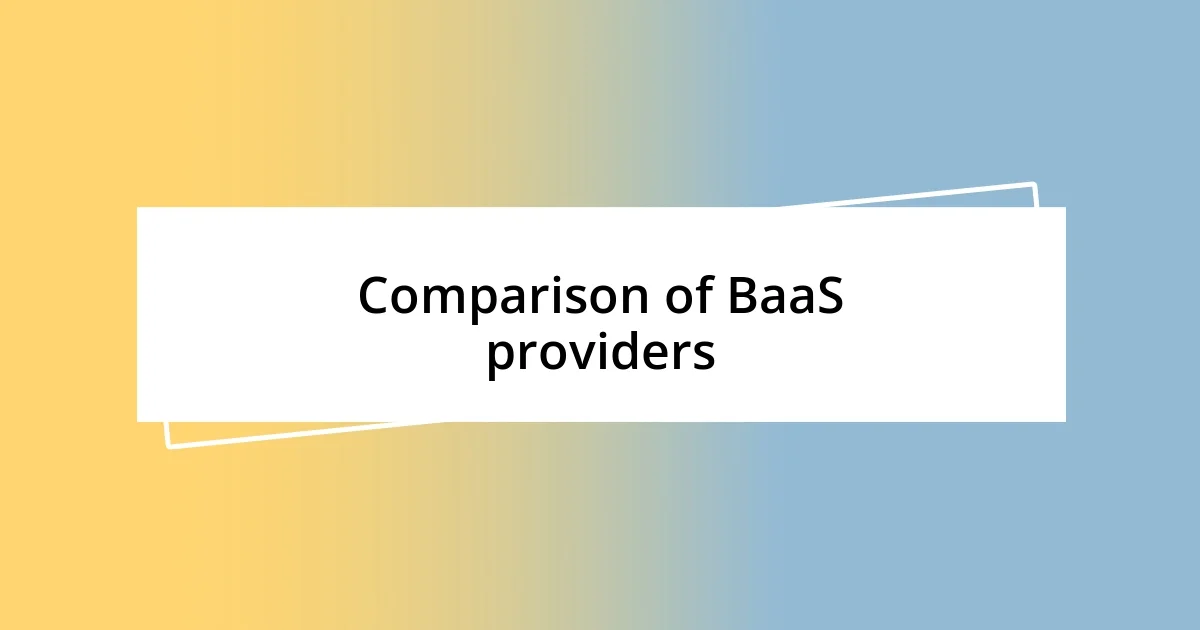
Comparison of BaaS providers
When comparing various BaaS providers, it’s essential to consider what they each offer in terms of customer support and integration capabilities. I remember a time when I worked with two different providers; one was incredibly responsive, helping us troubleshoot within hours, while the other left us waiting for days. That experience taught me the value of having a partner who prioritizes client communication and support.
Pricing models also play a crucial role in your choice. I’ve observed that while some BaaS platforms may seem more affordable upfront, hidden fees can quickly add up. One provider I worked with offered a pay-as-you-go model, which seemed ideal at first, but additional transaction fees made budgeting a challenge. A clear, transparent pricing structure is vital to avoid any nasty surprises down the road.
The scalability of a platform is another aspect that stood out during my comparisons. For instance, I had a small client whose user base skyrocketed almost overnight, and they needed a provider that could accommodate that sudden growth without compromising performance. They found a BaaS solution that not only handled increased traffic seamlessly but also provided useful analytics for future decision-making. Seeing them thrive reassured me that choosing the right BaaS provider can make all the difference in a business’s success trajectory.
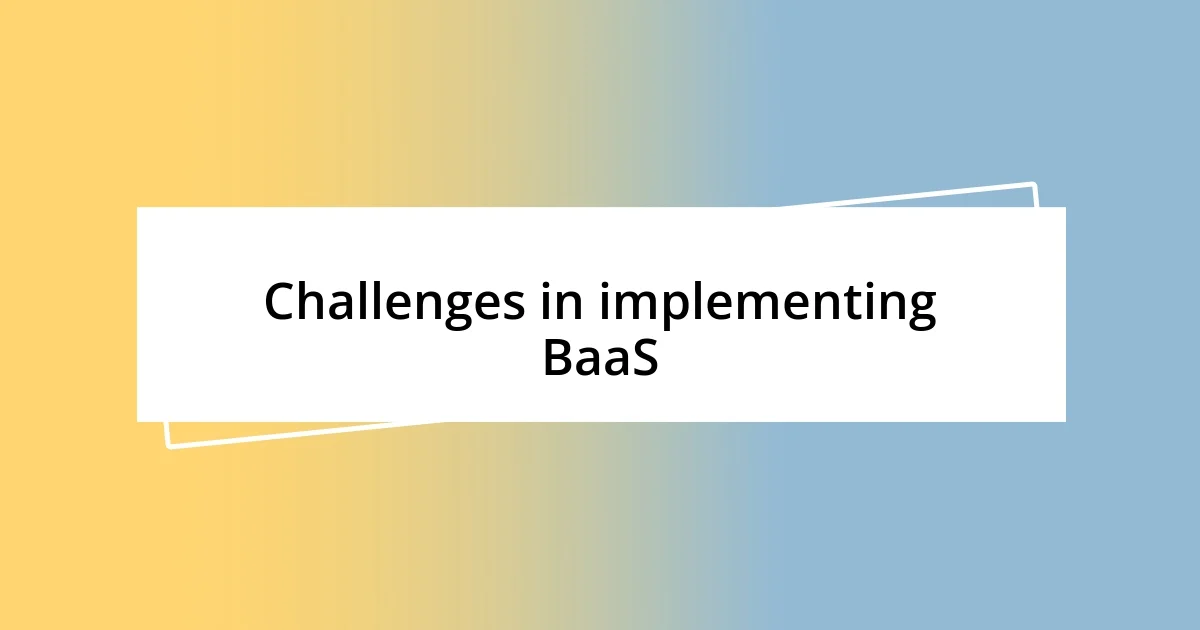
Challenges in implementing BaaS
Implementing BaaS can uncover various hurdles that businesses must navigate effectively. For instance, I remember a project where a client encountered integration issues with existing systems. Despite the promise of seamless API connections, they found themselves grappling with compatibility challenges that consumed time and resources. Have you ever faced a situation where the expected ease didn’t align with reality? It’s crucial to scrutinize integration capabilities before committing.
Another significant challenge lies in regulatory compliance. As someone closely involved in BaaS projects, I witnessed the struggle of a fintech startup trying to meet various legal requirements. They underestimated the complexities of compliance, which led to delays in product launches. I often wonder how many innovative ideas are stifled by the overwhelming regulations in this space. Finding a provider that not only understands but also facilitates compliance can truly make a difference.
Additionally, there’s the ever-present concern of data security. I’ve worked with businesses that felt anxious about migrating sensitive information to a third-party platform. They worried about potential data breaches and the consequences of mishandling personal information. Such fears aren’t unfounded; they’re a reality that can hold back even the most exciting BaaS implementations. Establishing trust in a provider’s security measures is indispensable, but it can be a daunting task in an age where data is so vulnerable.

Future trends in BaaS
As I look ahead, one of the most exciting trends in BaaS is the growing emphasis on customization. I recently observed a shift where businesses are no longer settling for one-size-fits-all solutions. It’s fascinating to see how providers are increasingly allowing companies to tailor features specific to their needs. Have you ever wished that a platform could just fit perfectly instead of making you adapt to it? Customization can enhance user experience significantly, and I’m eager to see where this trend takes us.
Another notable direction is the rise of artificial intelligence (AI) integration within BaaS platforms. In my experience, AI can revolutionize how businesses analyze their data and predict customer behaviors. I once collaborated with a company that leveraged AI to personalize their user interactions, resulting in a noticeable increase in customer engagement. It left me pondering—how can BaaS companies harness AI further to enhance decision-making processes? This integration could lead to smarter, more intuitive solutions, fundamentally changing the landscape of financial services.
Regulatory technology, or RegTech, is also set to play a pivotal role in the future of BaaS. I recall participating in discussions about the complexities that startups encounter in meeting compliance requirements. What if BaaS platforms not only handled transactions but also equipped users with tools to simplify compliance? By integrating RegTech solutions, providers could alleviate some of that burden, allowing businesses to focus on innovation rather than getting tangled in red tape. The potential impact of such advancements is truly profound, and I can’t help but feel optimistic about the future of BaaS in this regard.
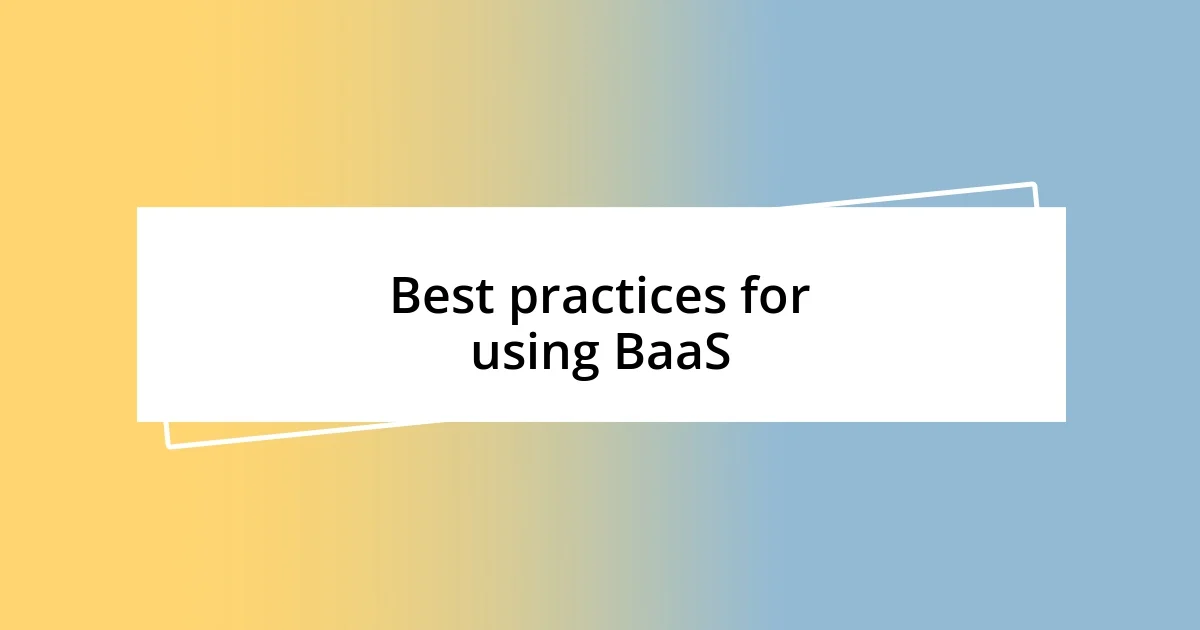
Best practices for using BaaS
When using BaaS, one of the best practices I’ve learned is to prioritize thorough due diligence on your chosen provider. I once worked with a startup that hastily committed to a BaaS platform without fully investigating its track record. The result? A delay in their launch due to unforeseen compatibility issues. I always ask myself, how well do we really understand the infrastructure behind these platforms? A careful evaluation can save time and resources down the line.
Another practice that has proven invaluable is maintaining open communication with the provider. During a project, I fostered a regular feedback loop with my BaaS partner. This transparency not only helped to address minor problems before they escalated but also built a genuine partnership. It makes me wonder: how often do we underestimate the value of a simple conversation? Establishing trust and clarity can transform the relationship and enhance the overall experience of using the platform.
Lastly, I’ve found that continuous training for staff engaged with the BaaS services is essential. I recall an instance where a team struggled with navigating the platform due to a lack of understanding of its nuances. The frustration was palpable, and it sparked me to think about the importance of ongoing education. How prepared is your team to adapt and evolve with the technology? Investing in training can empower employees, enabling them to leverage BaaS capabilities fully and drive innovation forward.














